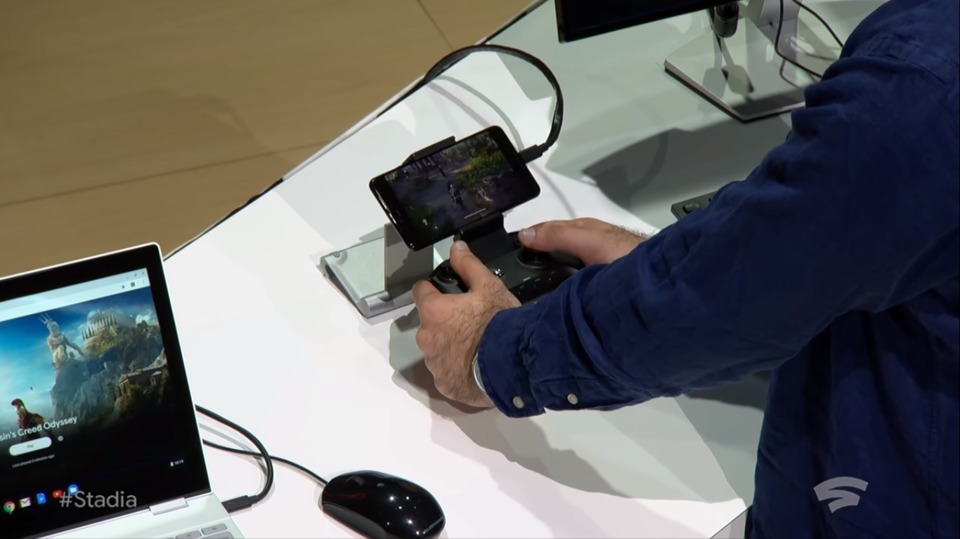The Hidden Cost of Game Streaming

Google made a big hullabaloo announcing plans to dip its feet into the video game world recently. Whenever Google does something/anything nowadays, it garners interest both public and commercially. Of course, the interest wasn’t that Google was trying to involve themselves in this industry, but that they were trying (promising?) they had solved how to stream games to people negating hardware needs and costs. Of course in the most, Silicon Valley megacorp way possible they promised the world and well-regarded games-man Phil Harrison shouted a lot of buzzwords - “4K” “HDR” “Stream to anything” “Youtube functionality” “Low Latency” - but not much was said about distribution and cost. Like many things in this social media driven world, people are lining up on both sides for various reasons. There are clearly a lot of potential holes in Google’s perfect blueprint and at the very least Google has much to prove in regards to announcing some pie in the sky move and actually sticking with it. At the very least, even the staunchest of supporters for Stadia have to realize Google’s track record is wishy-washy at best. Only a handful of cities still only have access to Google Fiber, remember how hot Google Glass was and how much praise Google got for moving things forward… that lasted a good couple of months, didn’t it? Google isn’t the only horse in this race, of course, Microsoft is gearing up to be Google’s main competition at this point in the streaming game world, but Wal-Mart now seems interested, Sony and Nintendo are certainly looking at their own solutions, Apple is hanging around, and Amazon has been building up some internal game development and also has some experience with streaming services with Amazon Prime and Twitch. The reason they all are interested is that as game streaming becomes more viable, they need to create a hold on the consumer the same way Netflix did and Blockbuster didn’t. And if they can gain a Netflix like hold on the consumer it allows them to gain control on the pricing of the service.

While the fear of losing access to the games you spend money on is partly a shift from how videogames have always worked, this fear is legitimate. If I wanted to play Zelda II (and I do because that game is great!), Nintendo has offered plenty of paths to do so that avoid me hooking up my NES with composite cables to a 4K TV. But plenty of NES games I love like Who Framed Roger Rabbit that doesn’t have the resellable value Zelda or Mario carry can also still be played because those games exist in perpetuity, on a cartridge. In 20 years this isn’t going to hold true for a game like Destiny. If you bought The Force Awakens on VUDU a couple of years ago and Wal-Mart decides to cut VUDU in cost-saving maneuvers, guess what, you no longer can freely watch a copy of The Force Awakens. The same can hold true for Google Stadia and can be especially so if they get into first-party development as it seems they are. Google stayed far away with anything having to do with price/stores with the Stadia announcement, including if they are even going to make this some sort of monthly service or if you’ll just pay a la carte. Microsoft already has experience offering a service to Xbox users for a monthly fee that has garnered mostly positive remarks. Though Gamepass provides downloads for users, it’s not hard to imagine their streaming service also going through Gamepass. It also provides Google, Wal-Mart, etc. a real-world sample of a games service working. And for as much herald Gamepass gets right now, myself included as it is a good deal, paying $10 a month to access a boatload of games isn’t going to stay. And this is the hidden cost of game streaming. I’m going to stick with Microsoft’s Gamepass just as an example because it already exists and has a price attached to it. It’s not hard to see the similarities between Gamepass and Netflix. But one thing nobody seems to include into the conversation is that Microsoft controls the pricing, much like Netflix does. So while it’s a relatively good deal for $10 a month to get access to a bunch of games including first-party titles on release day, is it really so hard to see that price at $15 or $20 by 2021? It is the way it is now because they need to win back the people they lost in 2013. Just like Sony implemented Playstation Plus and kept PSN free during the end of the PlayStation 3 to reach out an olive branch, Microsoft is doing the same now. But if Microsoft earns back the folks they lost with the new generation around the corner and add game streaming to Gamepass, when does the first price hike happen. If they add one new day-in-date third party/indie game a month does Gamepass go to $11.99? If they add game streaming and game downloads will it go up to $13 or $14? If they add 4K streaming games does it go up? If they buy out EA Access and make a deal for EA stuff to be on Gamepass, does it go up? If they start investing a ton in exclusives, ala Netflix, because that is the only true differential between them and Google and Sony, does it go up again? Do they cut out the storefront and only offer games via Gamepass at some point? What happens to people who only play a few games a year if that’s the case? Are they forced into monthly service so they can play 1 game? Not to mention they control what is available. Games already leave Gamepass, just like shows and movies leave Netflix. Microsoft at any point could say first party exclusives are day-in-date but they are gone after 1 year. Owning a game means I can still play Who Framed Roger Rabbit on my NES 30+ years later without hoping a curated service provides it for me, it also means younger players can see what foundation games were built on. While the long-term fear of losing control on ownership of games is fear towards the artistic and historic preservation of the industry, the short-term fear is losing control on pricing.
Log in to comment